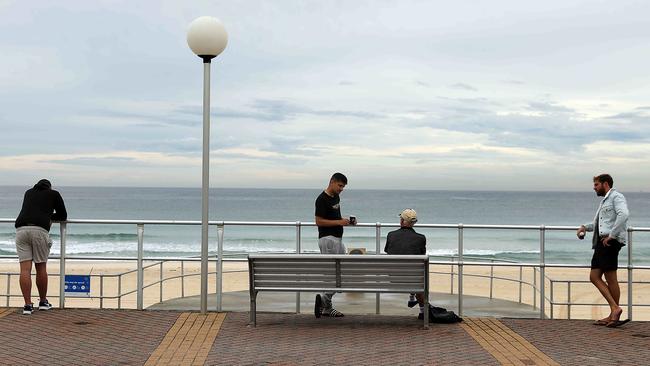Coronavirus: Two-people rule a dilemma for many
The limit on public gatherings of two people presents a dilemma for many Australians.

Scott Morrison staved off a “lockdown” for Australians at the weekend by tightening up social-distancing rules, limiting public gatherings to two people.
But this unprecedented restriction on movement, to combat the spread of coronavirus, could be indistinguishable for many people from the next step, a total lockdown. The elderly and chronically ill are advised not to venture out at all.
The two-people rule presents immediate dilemmas for the rest. The Prime Minister said he wanted to be “practical” about social distancing. Yet how can supermarkets and other retailers be permitted to stay open if gatherings of more than two are prohibited?
People can still buy medical supplies from pharmacists. How can they avoid inevitable contact with others?
Families can continue to live in the same household, under the same roof, no matter how large their numbers, but cannot associate with others. How can separated parents adopt a workable regime for child access, especially at handover times, when breaching the two-people rule would seem unavoidable?
The answer, say health experts, lies in social reality: following the prescribed order wherever possible, stay sensible. Some dilemmas can only be resolved by accepting there are exceptions, and even some inconsistencies.
State police now have the power to enforce social-distancing rules and issue on-the-spot fines for breaches, yet they might need to exercise discretion. Sounding out a person’s reasons for moving around might be preferable to imposing instant penalties.
The essence of the two-people rule, when the biggest risk of coronavirus has now shifted from transmission from overseas travellers to the general community, is that infection can be halted if people cease coming into contact with one another. Only then, says Stephen Duckett from Melbourne’s Grattan Institute, will COVID-19 have “nowhere to go” and “peter out”.
Morrison’s compromise to the rule is straightforward. “When you are going out for shopping, you should be going for just stuff you need, and do it, and get home,” he said on Sunday. “It is not a time for browsing. It is not a time for catching up with friends or bumping into people and having a long conversation.”
It bothers John Dwyer — the public health professor from the University of NSW and a prominent figure in the campaign against HIV/AIDS — that some in the community might misinterpret the two-people rule as encouraging social engagement providing it is limited to a pair.
“If you live together, OK, that’s fine, as pointed out by the Prime Minister,” Professor Dwyer said. “But what’s puzzling is: Why a group of two? Is it all right now for Jack, my neighbour, and I, to go out for a walk? It’s only safe if you know neither is infected. So you really can’t create a social scene with other people.”
While Professor Dwyer would prefer a lockdown now to hit the spread of virus hardest, he acknowledged essential services such as supermarkets and pharmacies must stay open. Any decision to limit social contact to two is an arbitrary one, he said.
On that basis, he argued that retailers considered non-essential such as department stores, book shops and hairdressers should close now. The construction industry should do the same, he added.
He accepted life must go on, with some semblance of normality, for separated parents needing to arrange access to their children.
“But if parents can negotiate it, just for the next six months or so, maybe it is possible to use Facetime with the kids and not have the handover every fortnight because of the special circumstances we face,” Professor Dwyer said.
“You’ve got to look after children, and if a child is less safe remaining in a certain environment, then you have to compromise.”
He also said the limit of five at weddings, and 10 a funerals, was reasonable.
“There are social realities, but the problem with an infection like COVID-19 is that neither party can know for sure if the other is practising social distancing,” he said.
At an inner-city Sydney suburban shopping centre on Monday, the notice on a Bed Bath N Table shop window said the retailer was trying to limit customers to 10 at any time. At Berkelouws bookshop, shoppers were advised the store limit was 18. Flight Centre had no limit but urged people not to queue if service desks were at capacity. Woolworths placed “X” spot markers near checkouts to distance shoppers, while signs at Coles asked shoppers to stay 1.5m apart.
Retailers including Myer have shut their doors, while restaurants and cafes are permitted to serve only takeaway.
New public areas — in addition to pubs, clubs, gyms, places of worship — have been added to the list of closures: playgrounds, outside gyms and skate parks.
Outside these parameters, the rule seems to be whatever goes.








To join the conversation, please log in. Don't have an account? Register
Join the conversation, you are commenting as Logout